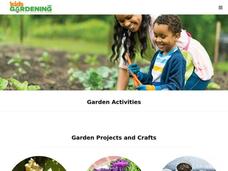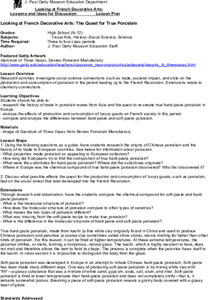Curated OER
Ozone and Temperature Data Analysis, South Pole Antarctica
Learners discuss the layers of the atmosphere, and the history of the ozone hole. They discuss the chemistry of the ozone formation. Students compare seasonal data collected with ozonesondes. They compare Antarctic and Arctic ozone hole...
Curated OER
The Properties of Metals
In this properties of metals worksheet, students read about the history of metal use and their properties. Students read about metallic bonding and answer three questions about bonding in metals.
Curated OER
Inside an Atom
In this atom worksheet, students read about the history of the discovery of the atom. Students write a story, poem, song or other creative project in which they shrink to an incredibly small size and are trapped in a carbon atom.
Curated OER
Polymer Lesson Plans
Try these hands on lessons dealing with polymers to get students thinking chemistry and the structure of molecules.
Curated OER
Strings and Things: An Investigation into pH
Students test the pH of everyday substances. In this chemistry instructional activity, students test the pH of household substances using litmus paper to classify substances as acids or bases, then use pH to test the validity of the...
Curated OER
Making Paper
Young scholars read about the history of paper production and make their own recycled paper. In this paper making activity, students follow the directions to make paper from recycled paper. Young scholars also learn about making paper...
Curated OER
Teaching the Scientific Method Using Adhesives
Students research on the history of adhesives. In this science lesson, students select one test to use in finding the stickiness of adhesives. They collect data and formulate a conclusion.
Novelinks
Count of Monte Cristo: Concept/Vocabulary Analysis
Explore the complex themes of Alexandre Dumas' The Count of Monte Cristo with a concept and vocabulary analysis lesson plan. Lead your class in a discussion about the underlying social and historical issues surrounding the novel, as...
American Chemical Society
Development of Baking Powder
Did you know baking powder can be used to treat acne, whiten teeth, and make sugar cookies? The activity on the development of baking powder is ready-to-go with no preparation required. Through readings, pupils answer questions, complete...
American Chemical Society
Joseph Priestley, Discoverer of Oxygen
Do you want to hear a joke about nitrogen and oxygen? NO. We all know there is oxygen in the air and that plants produce oxygen, but how was it discovered? Scholars read a handout, answer questions, and analyze material in the...
American Chemical Society
Norbert Rillieux, Thermodynamics and Chemical Engineering
The man who invented the earliest examples of chemical engineering was an American-born, French-educated, free man of color before the Civil War, and went on to translate Egyptian hieroglyphics. There is something of...
Herff Jones Education
Chemical Energy
Provide the class with a quick lesson on chemical energy as they are assisted in creating hot and cold packs to demonstrate energy transfer between objects. They observe the energy change in matter as it transforms and...
NOAA
It's a Roughy Life
Scientists recently discovered several previously unknown species at the Bear Seamount off the coast of New England. Scholars research these new species — benthopelagic, benthic, and seamount fish — and find out what makes them...
It's About Time
Atoms with More Than One Electron
Provide young chemists with the ability to manipulate atoms and predict their results, in this sixth lesson. Pupils analyze energy patterns as they predict the amount of energy required to remove electrons from atoms. They compare trends...
US National Library of Medicine
Drug Use and Abuse: Past and Present
Pick your poison: tobacco, alcohol, opiates, cocaine, or marijuana. An online exhibition launches a research project that asks groups to select one of the five drugs and gather information on how the use of the drug and the regulations...
American Chemical Society
The Ups and Downs of Thermometers
What has a thermometer earned that your pupils haven't? A degree! After reviewing the previous lessons about molecules and degrees, scholars observe how thermometers work before building their own. The module includes a activity sheet.
Curated OER
Mixing It Up!
Third graders identify the different states of matter. In this science lesson, 3rd graders describe the different components of solutions and mixtures. They create emulsions, foams and suspensions in the lab.
Curated OER
The Chemistry of Fire and Other Oxidation Reactions
Learners explore the process of combustion.
Curated OER
Mobile Phones
Investigate how mobile phones impact their lives through this technology lesson that has learners discuss the history of the cell phone and research how cell phones are being used in third world countries. Students create a blog for new...
Curated OER
Our Universe: Designed or Evolved?
Students brainstorm and write arguments for Evolution and Intelligent Design. They research the history of each of these ideas. They also examine the controversy of teaching one or both ideas in schools.
Curated OER
NOVA scienceNOW-Profile: Brothers Chudnovsky: Moving Images
Young scholars examine digital images of the Unicorn tapestry. They discover why the Chodnovsky brothers had a difficult time piecing together digital scans of three-by-three-foot sections of ancient tapestry.
Curated OER
Looking at French Decorative Arts
Students research the history of trade in porcelain wares from Asia and the quest to re-create true hard-paste porcelain in Europe and art in French society. In this French art lesson, students research and discuss the possible...
Curated OER
Fat Fast Foods
Students explore the fast food industry. In this fast food lesson, students research fast food restaurants and the food served. Students create a tri-fold handout to explain the history of fast food and types of food served. Students...
Curated OER
The Impact
Students see what inventors have to think about when making an invention. In this inventions lesson students examine Thomas Edison and the light bulb and the history of inventions.

























